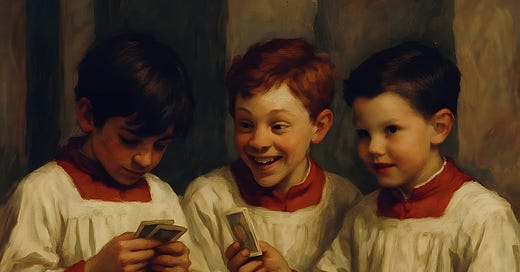The Grace of Getting It Wrong
I wonder if, in our fear of getting it wrong, we’ve grown timid about saying anything at all.
by Tony Humrichouser
It’s late Sunday night. The house is still. Tea cooling beside me. The clock insists it’s 11:34, and I’ve just been gently reminded that even good intentions need fact-checking.
Earlier today, I reposted a quote--a lovely one. “To be called woke in a world that sleeps through suffering is no insult.”
It felt true the moment I read it--clear and sharp, like a bell. I mentioned, offhandedly, that the new Pope had said it.
But he hadn’t. And someone kindly let me know.
So I did what modern people do when they stumble in public: I panicked slightly, deleted the post, and made tea.
But the truth is, what lingered wasn’t the embarrassment. It was the ache underneath it.
Because I hadn’t shared that quote because the Pope said it. I shared it because I believed it. Because it felt like a whisper of clarity in a crowded room.
And when I learned the name was wrong, I erased the whole thing--as if a message only matters when it carries a credential. As if a truth only stands when spoken by someone famous.
That’s what sat wrong.
We live in a time when every sentence wears a name tag. Where ideas are sorted like fruit--origin, ripeness, bruising, shelf life. And in that sorting, sometimes we forget to simply hold a thing and ask: Is it good?
Yes, accuracy matters. I’m not arguing that.
But there’s a difference between being accurate and being afraid. And I wonder if, in our fear of getting it wrong, we’ve grown timid about saying anything at all.
That quote--whoever wrote it--was not a battle cry, or bait, or brand. It was a benediction. A gentle invitation. A reminder that waking up to suffering doesn’t make you soft, or naive, or performative.
It makes you human.
So yes--I got it wrong. And I’ll own it. But I won’t apologize for having shared something kind.
And when I needed to steady myself, I turned to words I know are true. Words with names and courage behind them:
Martin Luther King Jr. said, “Our lives begin to end the day we become silent about things that matter.”
Desmond Tutu reminded us, “If you are neutral in situations of injustice, you have chosen the side of the oppressor.”
That’s the company I want to keep.
And as I sit here, deep into Sunday, I can’t help but think of St. Jerome.
We Altar Boys were always looking for ways to pass the time--before the Bride or the casket arrived. So we collected prayer cards.
They weren’t meant to be collectibles, of course. They were funeral announcements. Little paper elegies. But we didn’t know that. Not really. To us, they were sacred baseball cards--thin, holy rectangles passed between fingers and folded into shirt pockets with quiet awe.
Some had plain flat edges. Others had delicate scallops. But the rare ones--the ones the older families tucked into hymnals or handed out like heirlooms--had edges so finely cut they looked like lace. Not printed lace, but something more tactile. Like fabric. Like memory.
And St. Jerome? He was one of those cards.
What he got wrong: pride and temper. He argued too much. Held grudges. Made enemies.
But what he got right? He translated the Bible into Latin--the Vulgate--a work so vital and lasting it shaped the voice of Christianity for centuries.
A man full of fire and flaws… and still holy.
We live in a world too full of noise and not nearly full enough of grace. And every now and then, grace shows up wearing the wrong name tag. But it’s still grace.
And I still believe in sharing it.
Even when I get it wrong.
Especially then.



